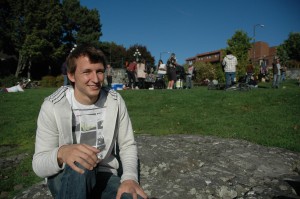Every Sunday for the past two and a half years, Interurban student Willem Brussow has driven his truck down to Wharf Street, unpacked his barbecue, and flipped burgers for those in need.

He calls it Tailgate Grill, and with help from fellow students and friends, Brussow serves 80 burgers every Sunday afternoon to street people and those who struggle to afford a good meal.
“My friend Jeff and I wanted to give back and just love people more,” says Brussow, a mechanical engineering student. “We drove to Streetlink, which is now closed, and set up on the back of my tailgate. We had a little camping barbecue and, I think, 12 burgers.”
Brussow’s efforts were at first met with confusion, but the locals soon warmed up to the impromptu cookout.
“The homeless people there came up to us and said, ‘What are you guys doing? You can’t barbecue here,’ and we said, ‘We’re handing them out for free,’ and people just came,” he says.
Tailgate Grill soon grew too big for Streetlink, so they moved to a patch of grass next to the infamous whale wall on Wharf Street.
“Now we do 80 burgers a week,” he says. “Rain, shine, snow.”
The people who come to Tailgate aren’t all homeless. “Maybe a quarter of the people who come here sleep outside. Other people are in homeless shelters, or don’t have much money, or don’t have many friends and just want community,” says Brussow.
The people eating burgers at Tailgate are clearly grateful, and Brussow gets a lot out of it, too.
“There are so many hungry people in Victoria, and this is something tangible that I can do. I get friendships out of this,” he says. “Most of the people here I know by name, a lot of them I know a bit of their story, and a few of them I would call friend.”
Ian Welle, also a mechanical engineering student at Interurban, has been helping out since day one.
“I started coming down here to tell these people that their lives are still worth something,” he says, “that they are beautiful people, that they are lovable, and that someone cares about them.”
